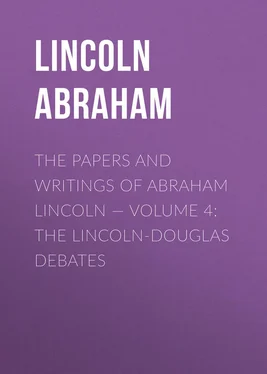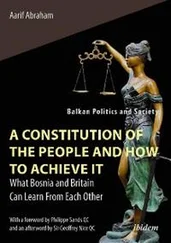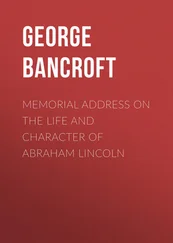Abraham Lincoln - The Papers And Writings Of Abraham Lincoln — Volume 4 - The Lincoln-Douglas Debates
Здесь есть возможность читать онлайн «Abraham Lincoln - The Papers And Writings Of Abraham Lincoln — Volume 4 - The Lincoln-Douglas Debates» — ознакомительный отрывок электронной книги совершенно бесплатно, а после прочтения отрывка купить полную версию. В некоторых случаях можно слушать аудио, скачать через торрент в формате fb2 и присутствует краткое содержание. Жанр: foreign_antique, foreign_prose, на английском языке. Описание произведения, (предисловие) а так же отзывы посетителей доступны на портале библиотеки ЛибКат.
- Название:The Papers And Writings Of Abraham Lincoln — Volume 4: The Lincoln-Douglas Debates
- Автор:
- Жанр:
- Год:неизвестен
- ISBN:нет данных
- Рейтинг книги:3 / 5. Голосов: 1
-
Избранное:Добавить в избранное
- Отзывы:
-
Ваша оценка:
- 60
- 1
- 2
- 3
- 4
- 5
The Papers And Writings Of Abraham Lincoln — Volume 4: The Lincoln-Douglas Debates: краткое содержание, описание и аннотация
Предлагаем к чтению аннотацию, описание, краткое содержание или предисловие (зависит от того, что написал сам автор книги «The Papers And Writings Of Abraham Lincoln — Volume 4: The Lincoln-Douglas Debates»). Если вы не нашли необходимую информацию о книге — напишите в комментариях, мы постараемся отыскать её.
The Papers And Writings Of Abraham Lincoln — Volume 4: The Lincoln-Douglas Debates — читать онлайн ознакомительный отрывок
Ниже представлен текст книги, разбитый по страницам. Система сохранения места последней прочитанной страницы, позволяет с удобством читать онлайн бесплатно книгу «The Papers And Writings Of Abraham Lincoln — Volume 4: The Lincoln-Douglas Debates», без необходимости каждый раз заново искать на чём Вы остановились. Поставьте закладку, и сможете в любой момент перейти на страницу, на которой закончили чтение.
Интервал:
Закладка:
Another one of the points Judge Douglas makes upon Judge Trumbull is, that when he spoke in Chicago he made his charge to rest upon the fact that the bill had the provision in it for submitting the constitution to a vote of the people when it went into his Judge Douglas's hands, that it was missing when he reported it to the Senate, and that in a public speech he had subsequently said the alterations in the bill were made while it was in committee, and that they were made in consultation between him (Judge Douglas) and Toomb's. And Judge Douglas goes on to comment upon the fact of Trumbull's adducing in his Alton speech the proposition that the bill not only came back with that proposition stricken out, but with another clause and another provision in it, saying that "until the complete execution of this Act there shall be no election in said Territory," — which, Trumbull argued, was not only taking the provision for submitting to a vote of the people out of the bill, but was adding an affirmative one, in that it prevented the people from exercising the right under a bill that was merely silent on the question. Now, in regard to what he says, that Trumbull shifts the issue, that he shifts his ground, — and I believe he uses the term that, "it being proven false, he has changed ground," I call upon all of you, when you come to examine that portion of Trumbull's speech (for it will make a part of mine), to examine whether Trumbull has shifted his ground or not. I say he did not shift his ground, but that he brought forward his original charge and the evidence to sustain it yet more fully, but precisely as he originally made it. Then, in addition thereto, he brought in a new piece of evidence. He shifted no ground. He brought no new piece of evidence inconsistent with his former testimony; but he brought a new piece, tending, as he thought, and as I think, to prove his proposition. To illustrate: A man brings an accusation against another, and on trial the man making the charge introduces A and B to prove the accusation. At a second trial he introduces the same witnesses, who tell the same story as before, and a third witness, who tells the same thing, and in addition gives further testimony corroborative of the charge. So with Trumbull. There was no shifting of ground, nor inconsistency of testimony between the new piece of evidence and what he originally introduced.
But Judge Douglas says that he himself moved to strike out that last provision of the bill, and that on his motion it was stricken out and a substitute inserted. That I presume is the truth. I presume it is true that that last proposition was stricken out by Judge Douglas. Trumbull has not said it was not; Trumbull has himself said that it was so stricken out. He says: "I am now speaking of the bill as Judge Douglas reported it back. It was amended somewhat in the Senate before it passed, but I am speaking of it as he brought it back." Now, when Judge Douglas parades the fact that the provision was stricken out of the bill when it came back, he asserts nothing contrary to what Trumbull alleges. Trumbull has only said that he originally put it in, not that he did not strike it out. Trumbull says it was not in the bill when it went to the committee. When it came back it was in, and Judge Douglas said the alterations were made by him in consultation with Toomb's. Trumbull alleges, therefore, as his conclusion, that Judge Douglas put it in. Then, if Douglas wants to contradict Trumbull and call him a liar, let him say he did not put it in, and not that he did n't take it out again. It is said that a bear is sometimes hard enough pushed to drop a cub; and so I presume it was in this case. I presume the truth is that Douglas put it in, and afterward took it out. That, I take it, is the truth about it. Judge Trumbull says one thing, Douglas says another thing, and the two don't contradict one another at all. The question is, what did he put it in for? In the first place, what did he take the other provision out of the bill for, — the provision which Trumbull argued was necessary for submitting the constitution to a vote of the people? What did he take that out for; and, having taken it out, what did he put this in for? I say that in the run of things it is not unlikely forces conspire to render it vastly expedient for Judge Douglas to take that latter clause out again. The question that Trumbull has made is that Judge Douglas put it in; and he don't meet Trumbull at all unless he denies that.
In the clause of Judge Douglas's speech upon this subject he uses this language toward Judge Trumbull. He says:
"He forges his evidence from beginning to end; and by falsifying the record, he endeavors to bolster up his false charge."
Well, that is a pretty serious statement — Trumbull forges his evidence from beginning to end. Now, upon my own authority I say that it is not true. What is a forgery? Consider the evidence that Trumbull has brought forward. When you come to read the speech, as you will be able to, examine whether the evidence is a forgery from beginning to end. He had the bill or document in his hand like that [holding up a paper]. He says that is a copy of the Toomb's bill, — the amendment offered by Toomb's. He says that is a copy of the bill as it was introduced and went into Judge Douglas's hands. Now, does Judge Douglas say that is a forgery? That is one thing Trumbull brought forward. Judge Douglas says he forged it from beginning to end! That is the "beginning," we will say. Does Douglas say that is a forgery? Let him say it to-day, and we will have a subsequent examination upon this subject. Trumbull then holds up another document like this, and says that is an exact copy of the bill as it came back in the amended form out of Judge Douglas's hands. Does Judge Douglas say that is a forgery? Does he say it in his general sweeping charge? Does he say so now? If he does not, then take this Toomb's bill and the bill in the amended form, and it only needs to compare them to see that the provision is in the one and not in the other; it leaves the inference inevitable that it was taken out.
But, while I am dealing with this question, let us see what Trumbull's other evidence is. One other piece of evidence I will read. Trumbull says there are in this original Toomb's bill these words:
"That the following propositions be and the same are hereby offered to the said Convention of the people of Kansas, when formed, for their free acceptance or rejection; which, if accepted by the Convention and ratified by the people at the election for the adoption of the constitution, shall be obligatory upon the United States and the said State of Kansas."
Now, if it is said that this is a forgery, we will open the paper here and see whether it is or not. Again, Trumbull says, as he goes along, that Mr. Bigler made the following statement in his place in the Senate, December 9, 1857:
"I was present when that subject was discussed by senators before the bill was introduced, and the question was raised and discussed, whether the constitution, when formed, should be submitted to a vote of the people. It was held by those most intelligent on the subject that, in view of all the difficulties surrounding that Territory, the danger of any experiment at that time of a popular vote, it would be better there should be no such provision in the Toomb's bill; and it was my understanding, in all the intercourse I had, that the Convention would make a constitution, and send it here, without submitting it to the popular vote."
Then Trumbull follows on:
"In speaking of this meeting again on the 21st December, 1857 [Congressional Globe, same vol., page 113], Senator Bigler said:
"'Nothing was further from my mind than to allude to any social or confidential interview. The meeting was not of that character. Indeed, it was semi-official, and called to promote the public good. My recollection was clear that I left the conference under the impression that it had been deemed best to adopt measures to admit Kansas as a State through the agency of one popular election, and that for delegates to this Convention. This impression was stronger because I thought the spirit of the bill infringed upon the doctrine of non-intervention, to which I had great aversion; but with the hope of accomplishing a great good, and as no movement had been made in that direction in the Territory, I waived this objection, and concluded to support the measure. I have a few items of testimony as to the correctness of these impressions, and with their submission I shall be content. I have before me the bill reported by the senator from Illinois on the 7th of March, 1856, providing for the admission of Kansas as a State, the third section of which reads as follows:
Читать дальшеИнтервал:
Закладка:
Похожие книги на «The Papers And Writings Of Abraham Lincoln — Volume 4: The Lincoln-Douglas Debates»
Представляем Вашему вниманию похожие книги на «The Papers And Writings Of Abraham Lincoln — Volume 4: The Lincoln-Douglas Debates» списком для выбора. Мы отобрали схожую по названию и смыслу литературу в надежде предоставить читателям больше вариантов отыскать новые, интересные, ещё непрочитанные произведения.
Обсуждение, отзывы о книге «The Papers And Writings Of Abraham Lincoln — Volume 4: The Lincoln-Douglas Debates» и просто собственные мнения читателей. Оставьте ваши комментарии, напишите, что Вы думаете о произведении, его смысле или главных героях. Укажите что конкретно понравилось, а что нет, и почему Вы так считаете.












